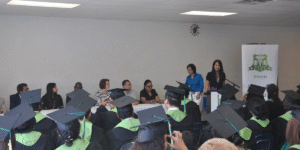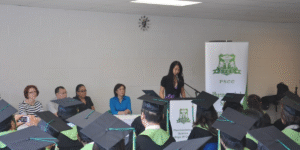The healthcare field continues to expand quickly, creating a strong need for skilled professionals who play vital roles behind the scenes. Among the most essential of these are medical laboratory technicians (MLTs), who support diagnostics, research, and pharmaceutical development. To excel in this profession, you’ll need a combination of technical expertise, a solid understanding of science, great interpersonal abilities, and some important personal qualities. A medical laboratory technician program provides the training and preparation needed for certification and readiness to work in real-world laboratory settings.
Exploring the Role of a Medical Laboratory Technician
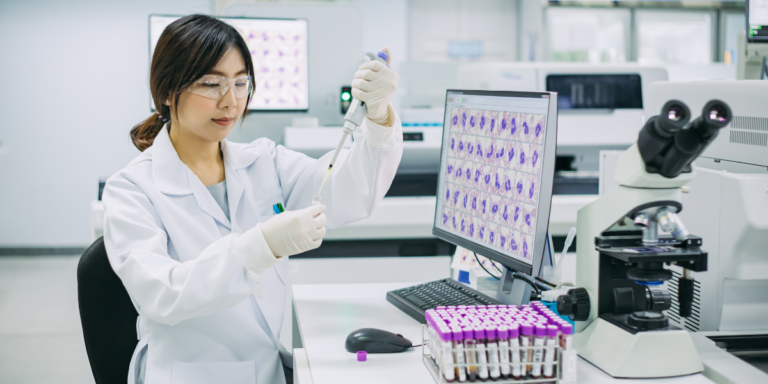
A medical laboratory technician program prepares students to carry out critical laboratory procedures that directly influence patient care. MLTs are employed in hospitals, clinics, research facilities, and pharmaceutical companies, where they ensure accurate test results and reliable reporting. Their role demands precision, responsibility, and the ability to collaborate effectively with doctors, nurses, and other healthcare staff.
Daily Tasks and Responsibilities
Daily responsibilities for MLTs include collecting and analyzing specimens, preparing lab equipment, and maintaining safety protocols. Accuracy is vital, since small errors can affect diagnoses. Technicians also document results and communicate findings with healthcare professionals, supporting coordinated patient treatment.
Career Opportunities and Growth
Completing an accredited MLT program and earning medical laboratory technician certification creates access to many career paths. Technicians may choose to specialize in microbiology, hematology, or pathology. Career opportunities extend to hospitals, diagnostic centers, regulatory agencies, and pharmaceutical industries. With additional training and experience, MLTs can progress into supervisory or technologist positions, taking on greater responsibility.
Technical & Scientific Skills

Technical and scientific skills form the foundation of an MLT’s success. A medical laboratory technician program offers practical training that develops these abilities and prepares graduates for certification exams as well as workplace expectations.
Laboratory Techniques
Core laboratory techniques such as pipetting, centrifuging, sterilizing equipment, and using aseptic procedures are essential. Through medical lab technician training, students practice these methods until they achieve accuracy and confidence. Mastering these techniques ensures reliable specimen processing and trustworthy test results.
Equipment Maintenance
Technicians must ensure that laboratory instruments function correctly. This includes calibrating analyzers, cleaning microscopes, and addressing equipment errors. Training within a medical laboratory technician program teaches proper maintenance, reducing the likelihood of errors and equipment failures.
Data Entry and Reporting
Accurate data entry and reporting are central to laboratory operations. MLTs record patient information, input results, and create reports used in medical decisions. Medical lab technician training includes experience with professional reporting systems, where accuracy and confidentiality are emphasized.
Safety and Quality Control
Every MLT program highlights laboratory safety and quality control. Students learn specimen handling, biohazard disposal, and adherence to safety standards. These lessons are reinforced during clinical placements, ensuring graduates meet certification and compliance requirements.
Math and Science Knowledge
Applied knowledge of chemistry, biology, and mathematics is necessary for interpreting laboratory data. A medical laboratory technician program integrates these subjects, providing students with a deeper understanding of laboratory processes and preparing them to troubleshoot unusual results.
What Skills Should a Lab Technician Have?
Laboratory technicians must combine technical accuracy with strong problem-solving abilities. Important medical laboratory technician skills include specimen handling, instrument maintenance, precise reporting, and consistent safety practices. Students in an MLT program strengthen these skills, which are valued highly in the workplace.
Soft Skills for Laboratory Success
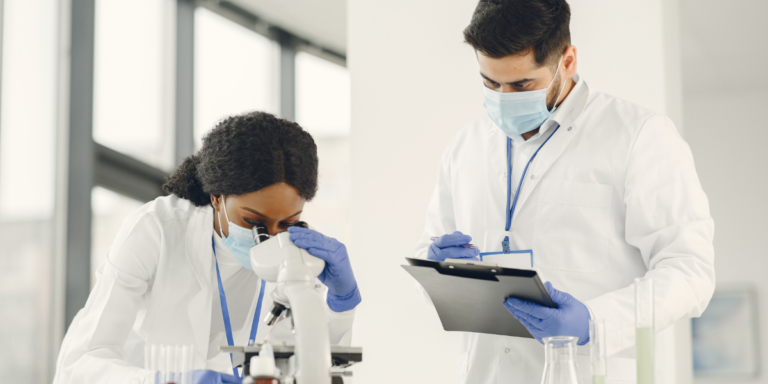
Technical skills are crucial, but soft skills complete the professional profile of a successful technician. A well-designed medical laboratory technician program fosters strong communication, problem-solving, adaptability, and teamwork alongside technical training.
Attention to Detail
Reliability in test results depends on careful attention to detail. In medical lab technician training, students learn to apply precision in documentation, calculations, and procedures. Consistency in this skill ensures accurate outcomes that support effective patient care.
Critical Thinking and Problem-Solving
Laboratory results can be complex, requiring technicians to analyze situations thoughtfully. An MLT program helps students build the ability to identify problems, consider possible causes, and determine the best course of action. This critical approach ensures patient results are both accurate and timely.
Communication
Clear communication is a vital skill for MLTs. Results must be shared with healthcare teams in an understandable and professional way. A medical laboratory technician program provides opportunities to practice written and verbal communication, preparing graduates to work confidently with colleagues and patients.
Teamwork and Collaboration
Most laboratory work is team-based. Success relies on coordinated efforts among technicians, technologists, and healthcare providers. Medical lab technician training emphasizes collaboration to support efficiency, safety, and accuracy in the laboratory.
Adaptability and Stress Tolerance
Laboratories are fast-paced and subject to change as new equipment and procedures are introduced. Medical laboratory technician training prepares students to adjust quickly, manage stress during high workloads, and remain effective under pressure.
What Skills Do You Need for a Medical Laboratory?
Key soft skills for work in a medical laboratory include:
- Communication skills to share findings clearly
- Teamwork to support efficient workflows
- Adaptability to embrace new procedures
- Critical thinking for complex problem-solving
- Attention to detail to maintain accuracy
These skills strengthen the technical knowledge acquired in a medical laboratory technician program.
Connect with Us for Details on the Medical Laboratory Technician Program
Physical & Personal Qualities

Beyond technical and soft skills, physical and personal traits are equally important for MLTs. A medical laboratory technician program helps students identify these qualities and refine them for professional success.
Dexterity and Coordination
Handling small instruments and samples requires precision and steady hand-eye coordination. Medical lab technician training helps students develop these skills, which are vital for accurate testing.
Patience, Focus, and Stamina
Laboratory work involves repetitive and detailed tasks. Patience and focus ensure consistency, while stamina supports long shifts. A medical laboratory technician program prepares students for these demands by reinforcing concentration and endurance.
Tolerance for Biological Samples
Technicians regularly work with blood, tissue, and other biological materials. Medical lab technician training prepares students to manage these responsibilities professionally, maintaining safety and composure.
Skills to Master as a Medical Laboratory Professional
A skilled laboratory professional combines technical abilities, soft skills, and personal qualities. An MLT program ensures students graduate with a balanced skillset, supporting certification and long-term success in the field.
Developing and Improving Lab Technician Skills
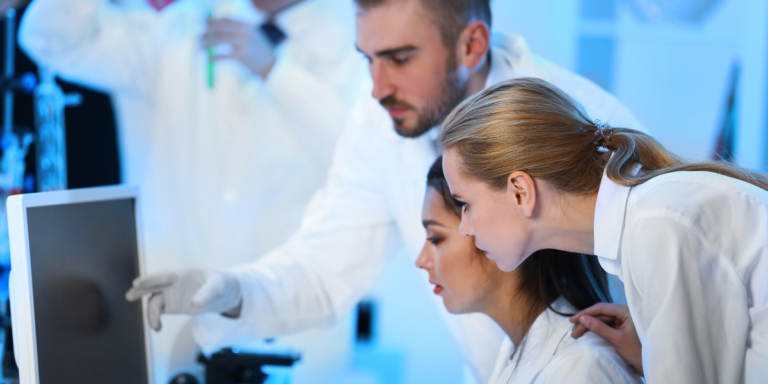
The path to excellence as an MLT extends beyond initial education. The real growth comes from a commitment to lifelong learning and gaining practical experience. A medical laboratory technician certification confirms competence, while ongoing development ensures long-term relevance.
How to Improve Lab Technician Skills
Students and professionals can build stronger skills by:
- Completing internships and co-op programs
- Gaining experience through clinical practicums
- Attending professional workshops and seminars
These experiences, often included in medical lab technician training, provide valuable opportunities to apply classroom lessons in real-world environments.
Continuous Learning and Professional Growth
Graduates of an MLT program strengthen their careers by pursuing advanced certifications, attending conferences, and building professional networks. Keeping up with technology and regulatory changes ensures steady professional growth and adaptability.
Learning with Pharma-Medical Science College of Canada
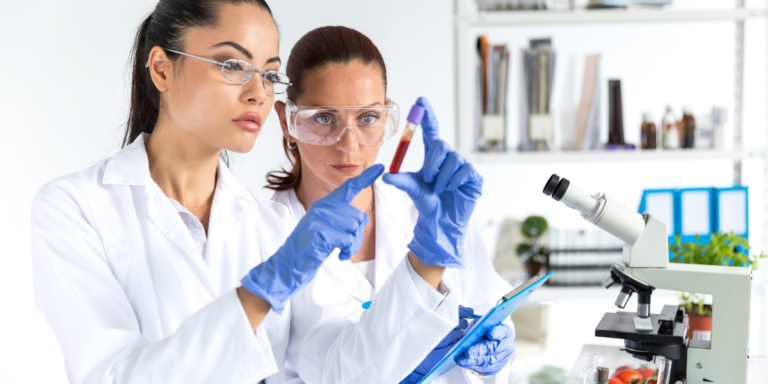
At Pharma-Medical Science College of Canada, we provide a comprehensive Medical Laboratory Technician Program in Ontario that blends nine months of hybrid classroom learning with two months of hands-on clinical placement. This approach guarantees that students acquire a robust understanding of theory while simultaneously cultivating practical skills in specimen collection, processing, and testing, all tailored for real-world lab situations.
Our dedicated instructors support students in mastering technical skills as well as professional practices such as communication, teamwork, and adaptability. We also assist students with financial aid guidance and career counseling, helping them prepare for medical laboratory technician certification and achieve their goals in healthcare and pharmaceutical careers.
Conclusion
Having a successful career as a medical laboratory technician relies on a unique blend of technical skills, scientific knowledge, good communication abilities, and personal attributes. Training begins with core laboratory skills such as equipment handling, safety protocols, and data reporting. Growth continues with the development of communication, teamwork, adaptability, and problem-solving. Physical attributes such as dexterity and stamina strengthen these skills, while professional success is sustained through certification, ongoing education, and continuous improvement. A complete medical laboratory technician program integrates all of these elements, preparing graduates to make lasting contributions to patient care, research, and the pharmaceutical industry.
Take the next step with Pharma-Medical Science College of Canada by joining our Medical Laboratory Technician Program. Build the skills you need for a rewarding career in healthcare, and contact us today to learn more or begin your application.



